Berlin attacks: Palace roads closed in security review
- Published
- comments
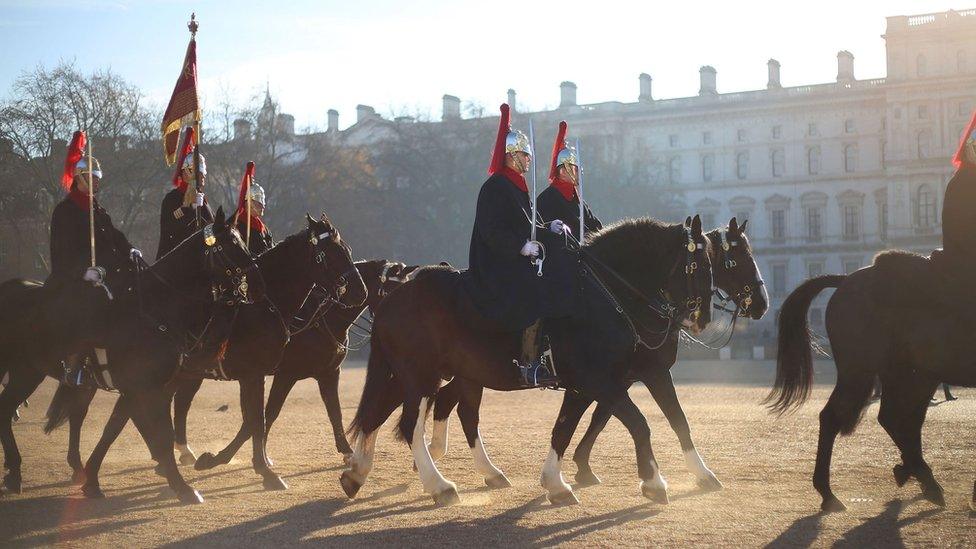
The guard change draws large crowds and has a substantial military presence
Roads around Buckingham Palace will be closed during changing the guard as part of a tightening of security in the wake of the Berlin market attack.
From Wednesday, surrounding roads will be shut from 10:45 to 12:30 GMT on the days of the ceremony.
The three-month trial - planned for some time - has been brought forward amid a UK security review.
Twelve people were killed and 49 injured when a lorry ploughed through a Berlin Christmas Market on Monday.
Police say they have a detailed plan to protect the public throughout Christmas and New Year celebrations across the UK.
Huge numbers of people will be in London as shoppers flock to the capital for the Christmas sales and more than than 100,000 revellers are expected to attend the capital's New Year's Eve fireworks display.
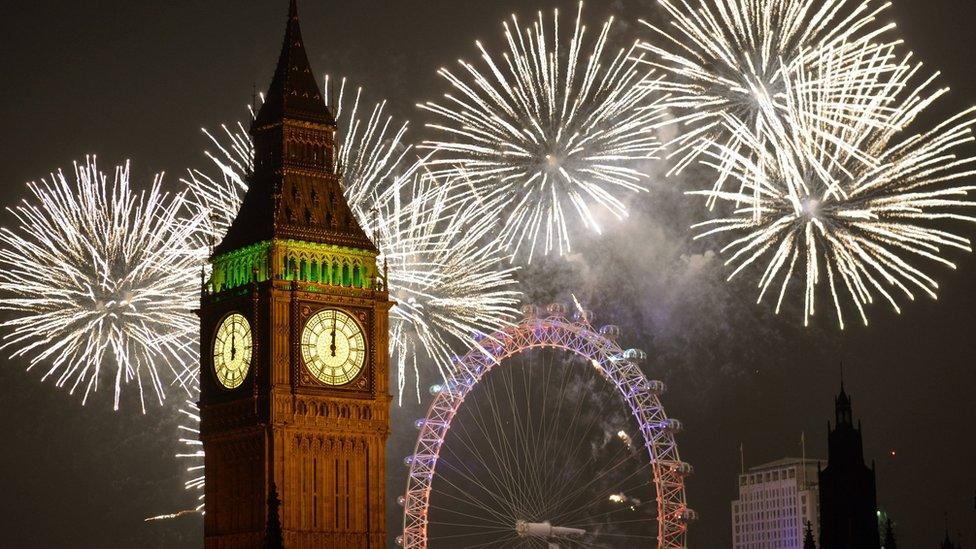
Security arrangements for big events over Christmas and New Year are under review
The Royal Parks, which manages the roads, has agreed to shut vehicle access to Constitution Hill, the Queen Victoria Memorial, Spur Road, Link Road and The Mall up to the junction with Marlborough Road.
It follows a request for the closures from the Met, who said they were a necessary precaution due to the event's high profile, large crowds and substantial military presence.
Extra security barriers around the palace were also put in place on Wednesday morning.
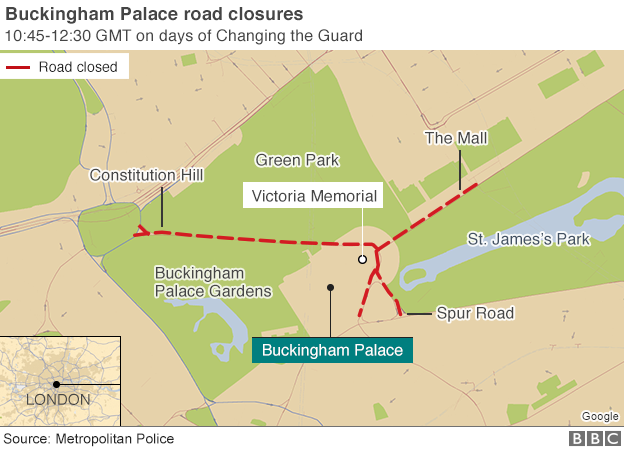
Scotland Yard and Police Scotland said they were reviewing "detailed plans" for the festive period as a precaution, following the attack in Germany and shooting of a Russian ambassador in Turkey.
Greater Manchester Police said it would step up patrols, including at almost 350 market stalls across 10 sites.
None of the forces said there was a specific or immediate threat.
Meanwhile, Prime Minister Theresa May has told German Chancellor Angela Merkel the UK "stands ready to assist".
A Number 10 spokesman said there were "no plans" to change the UK's security level, which currently stands at "severe", meaning a terror attack is highly likely.
Members of the public have been urged to remain vigilant and report to police any concerns.

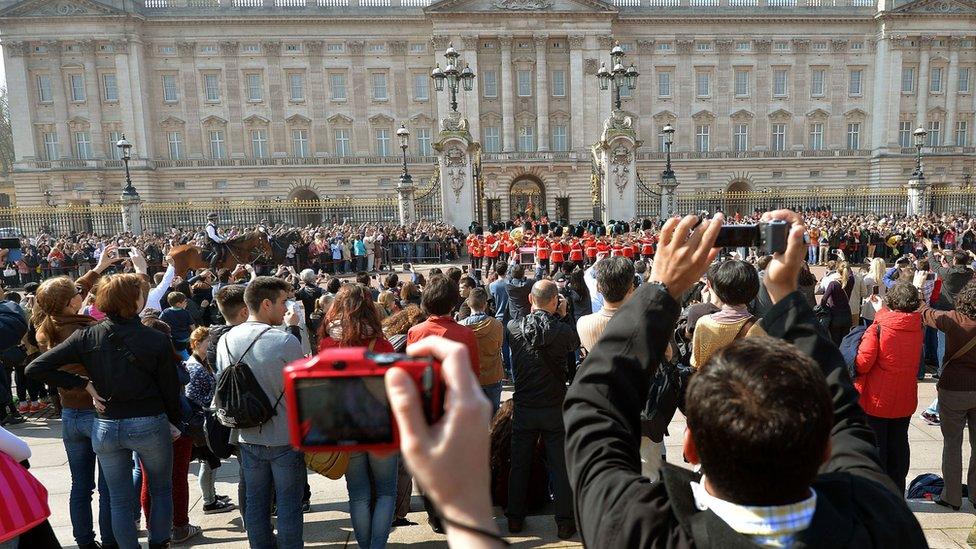
'You can't let them win'
By the BBC's Richard Lister at Buckingham Palace
Sightseers began gathering outside the gates of Buckingham Palace two hours before changing the guard, apparently undeterred by concerns raised by the attack in Berlin.
None that I have spoken to were aware that new security restrictions came into force today but most have noticed the police presence - it's always fairly high profile at this event but armed officers seem more in evidence than on previous occasions that I've been here.
Tourists we have spoken to say they are reassured by the police presence. One man from Germany said: "We should not be afraid of any terrorists at all. I feel very safe."
That was echoed by a Canadian couple: "The police are everywhere. We feel very safe." And a British family said they had considered the terror threat but stressed: "You can't let them win can you?"

City security
Mayor of London Sadiq Khan said he was working with police to review plans and reassure people coming into the city.
Elsewhere, extra security measures had already been put in place even before Monday night's attack.
Armed police were pictured at Newcastle's Christmas market, causing a debate by smiling while posing with automatic weapons.
Birmingham's Christmas market also put up concrete barriers in an attempt to stop lorry attacks after a vehicle drove into crowds celebrating Bastille Day in the French city of Nice in August, according to the Mirror, external.
BBC security correspondent Gordon Corera said it was hard to plan against this type of attack on "emotive targets" such as Christmas markets.
He said the relative simplicity of this sort of attack made it harder for security services to track the people involved.
Could attacks like the one in Berlin happen in the UK? Gordon Corera considers
Lord Ricketts, former national security advisor to David Cameron and ex-ambassador to France, told the BBC security guarding alone could not stop a determined terrorist intent on attacking a soft target.
Good intelligence was key, he said.
"We must never be complacent because there could be an attack here any time.
"But after the London Underground attacks in 2005, the government invested hugely in our security service, in GCHQ (the government's intelligence agency) and policing, which meant more people and better technology to get upstream and learn about plots developing early on."

'Run, hide, tell'
The National Police Chiefs' Council advised anyone caught up in an incident to:
First "Run" to a place of safety. This is a far better option than trying to surrender or negotiate
If there is nowhere to run, then "Hide". It is better to hide than confront
Remember to turn your phone to silent and turn off vibrate. Barricade yourself in if you can
Then finally, and only when it is safe to do so, "Tell" by calling police on 999

The UK government has released new travel advice for going to Germany, warning about the high threat of terrorism.
It warns travellers to remain vigilant and follow the advice of local authorities.
The German government has announced increased security at public buildings, major events, transport hubs and large public gatherings.
- Published20 December 2016
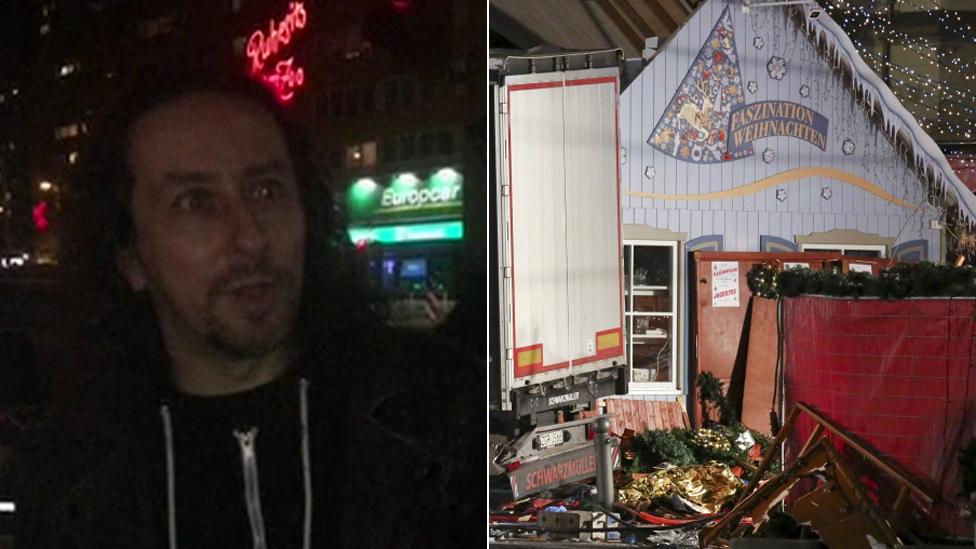
- Published20 December 2016